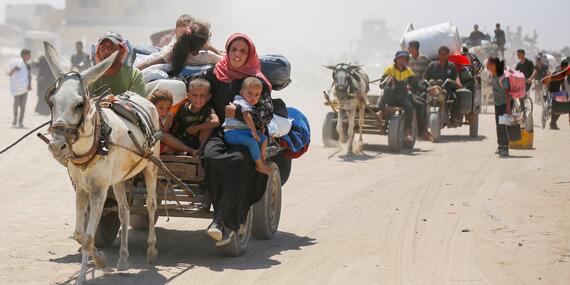Today's top news: Occupied Palestinian Territory, Ukraine

Occupied Palestinian Territory
OCHA has received initial reports that families are starting to flee toward Deir al Balah and western Khan Younis, following today's evacuation order issued by the Israeli military.
Both areas are already heavily overcrowded, with limited services and shelter spaces available.
The evacuation order includes areas located in the eastern part that had been designated by the Israeli military as a "humanitarian zone."
OCHA says frequent evacuation orders and relentless hostilities are further devastating Gaza’s health system – and making it increasingly difficult for people who have been repeatedly displaced to access essential services.
Nasser Medical Complex in Khan Younis has issued a new call for people to donate blood, with reports that the facility has received dozens of casualties today.
Meanwhile, OCHA warns that humanitarian workers in Gaza continue to face enormous risks, including to their personal safety.
The UN Relief and Works Agency for Palestine Refugees in the Near East (UNRWA) says that yesterday, Israeli forces shot at a UN convoy heading north to Gaza city. In a social media post this morning, UNRWA Commissioner-General Philippe Lazzarini said there were no casualties, but UNRWA’s teams had to duck and take cover. He noted that they had been traveling in clearly marked UN armoured cars and were wearing UN vests.
Lazzarini said one vehicle was severely damaged while waiting just ahead of the Israeli forces’ checkpoint south of Wadi Gaza. That vehicle left the convoy, and after the teams re-assembled, they were able to reach Gaza city.
He said the convoy’s movement was coordinated with the Israeli authorities – and that those responsible for yesterday’s incident must be held accountable.
Meanwhile, our humanitarian partners report that people in Gaza continue to face severe water shortages. Between 8 and 21 July, the daily average water supply was about 90,000 cubic metres – about a quarter of the amount produced prior to October of last year.
Damage to infrastructure, the lack of electricity, and shortages of fuel, spare parts and chlorine continue to hamper water production and purification, as well as sewage pumping. This is despite some improvements, including the installation of a solar-powered desalination plant in Deir al Balah, with the support of UNICEF.
In a new release today, UNICEF reported that on average, one Palestinian child has been killed every two days in the West Bank – including East Jerusalem – since October of last year.
UNICEF’s Executive Director Catherine Russell said the situation has deteriorated significantly, coinciding with the escalation of hostilities inside Gaza.
Ukraine
Aid workers continue to provide emergency support after an attack on the residential area of Mykolaiv City, Ukraine, on Friday.
Authorities have reported nearly 30 civilian casualties, including children and say the attack damaged homes and a playground.
Complementing the efforts of first responders, aid workers provided psychological support and distributed shelter materials to cover damaged windows and homes. They also provided hot meals to people affected by the attack, as well as first responders,
Today and over the weekend, hostilities in front-line regions of eastern and southern Ukraine killed at least seven people, according to local authorities. They have reported nearly 80 civilian casualties in total. More than 200 homes were damaged, as well as civilian infrastructure, including power lines, gas pipelines, education facilities, and ambulances.
Meanwhile, Ukraine’s national rail company say an attack on its facilities in the Kharkiv region on Saturday injured four workers.
Attacks on energy infrastructure continue to disrupt power and water supplies in several parts of Ukraine, including the Chernihiv, Poltava and Sumy regions. The UN Human Rights Office has documented more than 70 such attacks in April and May alone.
